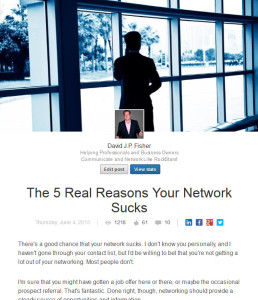 If you are under 25, what can you do to super-charge your network? Everybody offers networking as a critical component of success early in your career, but what does it actually mean?
If you are under 25, what can you do to super-charge your network? Everybody offers networking as a critical component of success early in your career, but what does it actually mean?
Plant Seeds In your Network Now
One of the biggest advantages you have as a professional at the beginning of your career is time. The contacts you meet know are going to be in your network for your entire career in one way or another. I see so many young professionals squander their opportunities to make new connections.
You should be actively investing your time in activities that bring new people into your sphere of influence. Invest 15% of your time into long-term relationships outside of prospects or direct work colleagues. When you are at the beginning of your career, it’s easy to put your head down and do your work.
 A lot of us think that our skills and a track record of success are the key to advancement and success. They are important ingredients, but you need access to opportunities in your career to leverage them. And that’s where your network comes in.
A lot of us think that our skills and a track record of success are the key to advancement and success. They are important ingredients, but you need access to opportunities in your career to leverage them. And that’s where your network comes in.
A broad and diverse group of contacts will be key to finding and accessing those opportunities. That’s why it worth putting some time into your network now.
Build Your Offline Relationships
That doesn’t mean you should just sit at your computer or your phone connecting with as many people on Twitter as possible. You want to build relationships that you can rely on down the line. And that means you’ll have to meet people offline.
Would you meet, date, and get married to someone who you only knew online? Probably not. So why do you think you can keep all of your work relationships on a digital level?
There some important ideas to keep in mind as you are building these relationships that will have an out-sized impact on the course of your career.
1. Invest in Shared Time and Space Together
The first place to look when building your offline network: Are you spending time with connections? Business relationships are human relationships first, and human relationships require opportunities to spend time together.
Digital communities gave us the promise of easily scalable relationships. It only takes a few moments to send a post that can be seen by tens, hundreds, or even thousands of people. But don’t mistake that for a relationship. You want to move beyond networking as a “transaction”.
Humans have evolved to be incredibly social creatures, but that happened in a real-world environment. A lot of that communication happens subconsciously through facial expressions, body language, and vocal tone. If you don’t physically share the same space, all of that is lost.
Action Steps:
If you are looking to create new contacts, this could mean going to those dreaded formal networking events or even a conference or trade show. You could also join a civic or non-profit organization, or even your company’s softball team. It could also mean being open to following up with someone you meet in a social setting who could be a good business contact.
Having coffee or lunch with someone will still be one of the most powerful ways to create a bond with a person. Why do you think most romantic dates involve you and another person spending time together (often over food)? Think of these as business dates where you are establishing a relationship
2. Embrace the Awkward and Unknown
 This might seem a little strange, but it needs to be addressed. Sometimes, face-to-face conversations can be awkward. There might be a pause as you think of the next thing to say. And it’s not always easy to walk into a room full of people you don’t know and start a conversation with one of them.
This might seem a little strange, but it needs to be addressed. Sometimes, face-to-face conversations can be awkward. There might be a pause as you think of the next thing to say. And it’s not always easy to walk into a room full of people you don’t know and start a conversation with one of them.
A common complaint from older professionals is that their younger colleagues hide behind their screens and smartphones. In the defense of the younger generation, almost everybody is falling into this trap these days. But too often we use digital communication to avoid the challenges of face-to-face conversations.
It requires emotional energy to reach out and build a relationship. Especially if you are newer to the workforce and don’t have as much experience. But that’s why it’s important to practice and build your capacities and skills.
Action Step:
Instead of fearing the times when you don’t know what to say or when you have to reach out to someone new, look at them as learning experiences. Those interactions are how you are going to practice your skills.
If you don’t have a lot of chances to practice, be proactive in looking for situations where you can get out of your comfort zone. And for the areas where you need more help, engage a coach, read some books, or watch some YouTube training videos.
3. Find Out How Other People View You
 Whether it’s trust and openness that we share through our body language, or the real meaning of our words that we communicate through vocal tone, there are hundreds (if not thousands) of small messages we send when we’re in someone’s presence.
Whether it’s trust and openness that we share through our body language, or the real meaning of our words that we communicate through vocal tone, there are hundreds (if not thousands) of small messages we send when we’re in someone’s presence.
Our brains are wired to make a slew of judgements about someone right when we meet them. And then as get to know them, we continue to formulate opinions and preferences based on our perspective.
Your audience’s perspective is important.
There’s an old sales adage that people do business with those that they know, like, and trust. And while you might not be trying to sell the people in your network on a widget or insurance policy, you are trying to sell them on you. Even though you are complex individual with layers and nuance, the people you interact with can only get a little slice of who you are. Because of that, all of these other signals are really important.
Action Steps:
Does the way you interact with others draw them in? Or does it push them away. Everything from the way you dress to the way you speak to the way you stand when you talk with someone can have an impact. Find someone you trust, such as a friend or mentor, and ask them for their feedback on how you come across to other people.
Remember that good interpersonal communication requires that you pay attention to how you are being received – it’s not just about saying what you want to say.
4. Audit your Online Brand
 Even in the offline world, your digital presence has an impact. Your online presence will precede you and flavor your relationships.
Even in the offline world, your digital presence has an impact. Your online presence will precede you and flavor your relationships.
Before I meet someone for the first time, I’ll check them out on LinkedIn or Google. When you meet someone at an event, there’s a good chance that they’ll check you out online before your next conversation (or they might even use what they find to determine whether they want to have another conversation with you).
Being effective in your offline relationships means that you recognize the power of your personal brand. When someone checks your social media profiles, your online bio, or your website, they’re looking for more information. That’s good! But you want to ensure that they are taking away the message that you want them to.
You don’t have to change who you are as a person, but there’s value in ensuring that you are putting the best foot forward. If the first images that come up online are from your crazy college trip to Costa Rica, maybe do a little clean-up. You want your reader to understand who you are, what you are about, and most importantly, how you can help them.
Action Step:
Read through your LinkedIn profile as if you knew nothing about the person in the profile. Is the message that you are getting the same one you want to share with your contacts? If not, schedule time into your calendar to work on it. Likewise, look at other social media platforms and ask if the information you are sharing is what you want to be known for.
5. Get a Hobby
 One of the best ways to build your professional relationships is to get a hobby. And no, going to the bar on the weekends is not a hobby.
One of the best ways to build your professional relationships is to get a hobby. And no, going to the bar on the weekends is not a hobby.
There are two big benefits that come from getting engaged in a new activity. First, it gives you an excuse to get involved in a community. A lot of young professionals struggle to make new connections because they’re out of school for the first time.
In school, you have a ready-built group of people who you spend a lot of time with and are focused on the same activities (you even have the same schedule). When you are out in the work world, you don’t have that luxury. It’s important to find new groups of people so that you can continue to build your relationships, and your relationship-building skills.
Secondly, it gives you something interesting to talk about. A big part of being a good conversationalist is taking an interest in others. But it’s also helpful to have perspectives and experiences that you can share with others.
Action Step:
What do you enjoy doing? It could be something from your childhood or an interest that’s always been in the back of your mind. It could be dancing, hiking, painting, music, woodwork, or anything else.
Go online, find a way to get involved in a class or group in your area. Get started somewhere. Make some new friends and have some new experiences. It’ll be fun and you’ll be investing in your career without it even feeling like work!
